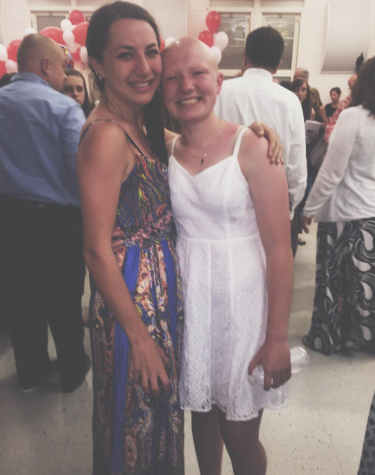By Theresa Schliep

When my little sister was five, she started losing her hair.
We first we noticed it in the bathtub. She and I were inseparable, and our parents often had us take baths together. Clumps of her hair started to fall out, and they’d float in the bathtub, clogging the drain, confusing us both. I thought she had cancer — my naivety associated baldness with cancer, not the chemotherapy used to treat the disease.
Eventually, my concerns were somewhat assuaged. Dermatologists diagnosed her with alopecia areata, an autoimmune disease in which the body attacks its own hair follicles, resulting in hair loss. Initially, she did not lose all of her hair. It fell out in patches, until the entirety of her cap was bald.
She did, though, still have a ring of long hair from ear to ear, on the base of her skull. My little sister had recently been given glasses for her astigmatism, and we half-heartedly joked she was a better looking Ben Franklin. We also dismally buzzed the rest of her hair, as to discourage the same jokes from the less affectionate mouths of her peers.
Since, she has lost all of her hair. All of the hair on her skull, eyebrows, leg and arm hair. A few eyelashes cling on, but her alopecia areata — partial hair loss — turned into alopecia totalis.
As my little sister has gotten older, she has felt the increasing pressure that all teenage girls feel. Pressure to have a flat stomach, thin legs, straight teeth and an acne free face. But, she faces a unique pressure — the pressure of fitting into the narrow mold that is femininity without having the most distinct symbol of it.
Comments about women’s looks have dominated the news cycle. President-Elect Donald Trump said he could not have sexually assaulted his accusers because they are not attractive enough. Harvard University recently terminated their men’s soccer season because of a leaked document containing their ratings of the attractiveness of the Harvard women’s soccer team. It seems, no matter their accomplishments, society reduces women to their looks.
This is intolerable. It is time for both men and women to champion women’s success, instead of dismantling it.
My little sister and I love the Netflix hit show “Stranger Things.” The star, Millie Bobbie Brown, moves things with her mind, steals Eggo Waffles and terrifies grown men all while donning a production mandated, closely cropped pixie cut.
In a recent interview with W Magazine, Brown spoke about her haircut: “I want people to say, ‘Oh, she’s nice,’ rather than, ‘Oh, she’s so pretty… Yes, it’s hard for anybody to go through something like that, but it’s harder for someone to through a disease like alopecia or cancer, losing their hair without any choice.”
Brown’s comment pleasantly surprised me. So often, hair loss is associated with cancer, as I mistakenly associated it with all those years ago. My little sister is often accosted by well-intending, albeit very upsetting, strangers in public, promising she is in their thoughts and prayers. Hearing such a young girl acknowledge the disease, while also prioritizing personality over something as superficial, as mundane, as common, as hair, was gratifying.
I do not want my little sister growing up in a world where her president degrades women’s looks, or her very own peers assign her a number based on her attractiveness. Women are so much more than their looks.
My little sister is beautiful. She doesn’t have alopecia, but is pretty. She has alopecia, and is pretty. It is part of who she is. And she is a beauty.

Women are much more than their looks! Your sister sounds like she has a great heart, and I wish her success and happiness.